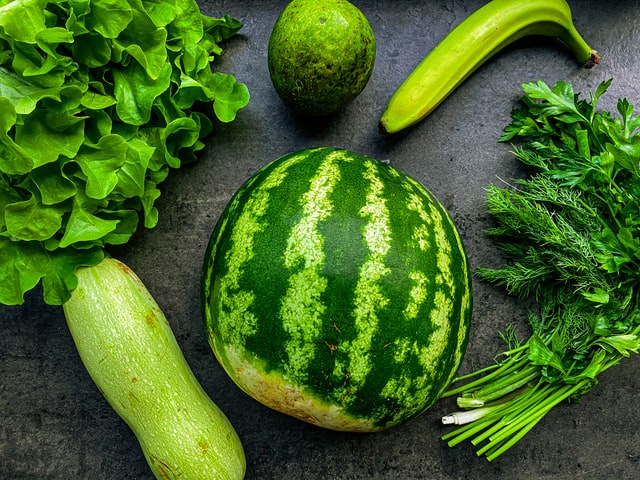Greek words of Turkish origin Posted by Ourania on Nov 18, 2021 in Culture, Vocabulary
What does a watermelon and a shoe have in common? Is there any difference between a “butcher” and a “meat seller”? You can use your imagination to find the answers or to carry on reading. In this post there is a list of common words used in standard Greek. All these words are of Turkish origin and we all use them in daily life. In some cases, we use the Greek words.
#1. αλάνα (η): a vacant lot.
Παράδειγμα:
Τα παιδιά παίζουν στην αλάνα της γειτονιάς. The children play at the vacant lot in the neighborhood.
#2. καβγάς (ο): The Greek word is φιλονικία. It means fight or argument.
Παράδειγμα:
Μετά τον καβγά συνέχισαν να παίζουν τάβλι, σαν να μην είχε γίνει τίποτα. After the fight, they kept playing backgammon, as if nothing had happened.
#3. γιακάς (ο): περιλαίμιο in Greek. It is a collar (neck of a shirt).
Παράδειγμα:
O γιακάς του πουκάμισου θέλει σιδέρωμα. The collar of the shirt needs ironing.
#4. γλέντι (το): a gathering of friends or relatives. There is always music and dancing.
Παράδειγμα:
Η Μαρία και ο Νίκος έκαναν ένα μεγάλο γλέντι μετά το γάμο τους. Maria and Nikos had a great party after their wedding.
#5. γρουσουζιά (η): κακοτυχία in Greek. It means bad luck.
Παράδειγμα:
Ο Στέλιος είναι προληπτικός. Πιστεύει ότι ο αριθμός δεκατρία φέρνει γρουσουζιά. Stelios is superstitious. He believes that number 13 brings bad luck.
#6. ζόρι (το): it means δυσκολία:a strain or great difficulty.
Παράδειγμα:
Η Σοφία περνάει μεγάλα ζόρια με την αρρώστια της κόρης της. Sophia is under a lot of pressure because her daughter is ill.
#7. καρπούζι (το): watermelon. The Greek scientific term is κίτρουλλος ο εριώδης.
Παράδειγμα:
Στον πατέρα μου αρέσει να τρώει καρπούζι με φέτα και μέλι. My father likes eating watermelon with feta cheese and honey.
#8. κέφι (το): good mood.
Παράδειγμα:
Η παρέα γιόρτασε τα γενέθλια της Δανάης με πολύ κέφι. In free translation: On Danae’s birthday, her friends celebrated in a cheerful atmosphere.
#9. κιμάς (ο): ground meat.
Παράδειγμα:
O Πέτρος είναι χορτοφάγος. Τρώει μακαρόνια με κιμά από σόγια. Petros is vegetarian. He eats pasta with soya mince.
#10. κουβάς (ο): bucket.
Παράδειγμα:
Όπως έτρεχαν τα παιδιά, έριξαν κάτω τον κουβά που ήταν γεμάτος νερό και απορρυπαντικό. As the children were running, they dropped the bucket that was full of water and liquid soap.
#11. μανάβης (ο): οπωροπώλης. It means greengrocer.
Παράδειγμα:
Ο μανάβης της γειτονιάς μας, πουλάει πάντα φρέσκα λαχανικά και φρούτα. The greengrocer in our neighborhood always sells fresh vegetables and fruits.
#12. μπακάλης (ο): the Greek word is παντοπώλης. It means grocer.
Παράδειγμα:
– Πολύ ωραίες ελιές! Από πού τις αγόρασες; These olives are so tasty! Where did you get them from? (free translation)
– Από τον μπακάλη της γειτονιάς. (I bought them) from the grocer in the neighborhood.
#13. μπογιά (η): βαφή or χρώμα. It means paint or dye.
Παράδειγμα:
Η μπογιά στους τοίχους έχει ξεθωριάσει. The paint on the walls has faded.
#14. ντιβάνι (το): bed with no headboard nor footboard that can be also used as a couch.
Παράδειγμα:
Δεν έχουμε έξτρα κρεβάτι, μόνο ένα ντιβάνι. We don’t have a spare bed, just a couch.
#15. ντουλάπι (το): cupboard
Παράδειγμα:
Πάρε ένα καθαρό ποτήρι από το ντουλάπι. Take a clean glass from the cupboard.
#16. παπούτσι (το): υπόδημα. It means shoe.
Παράδειγμα:
Τα παιδιά αγόρασαν καινούργια παπούτσια. The children bought new shoes.
#17. ταψί (το): baking tray
Έψησα το φαγητό στο μεγάλο ταψί γιατί είχα πολλούς καλεσμένους. I used the big baking tray to roast the food, because I had many guests.
#18. τζάμπα: δωρεάν. It means free of charge.
Ο περιπτεράς μου έδωσε ένα κουτάκι τσίχλες τζάμπα. The man at the “periptero” gave me a pack of gums free of charge.
#19. τεμπέλης (o τεμπέλης, η τεμπέλα, το τεμπέλικο): ακαμάτης. It means lazy.
Παράδειγμα:
O Mάνος είναι δεν είναι τεμπέλης. Δουλεύει ακόμα και τις Κυριακές για να στηρίξει τους γονείς του. Manos is not lazy. He works on Sunday too, in order to support his family.
#20. χασάπης (ο): butcher. The Greek word is κρεοπώλης which means “meat seller”. We use both words.
Παράδειγμα:
Ο χασάπης / κρεοπώλης της γειτονιάς μας πουλάει ελληνικό κρέας. The butcher in our neighborhood sells meat from Greece.
If you like this post, you might also like the post about English words used in Greek.

Build vocabulary, practice pronunciation, and more with Transparent Language Online. Available anytime, anywhere, on any device.






Comments:
Martin:
A request for clarification on αρέσω, αρέσει. Usually seen in 3rd person sing. after gen. eg μου αρέσει. In example 7, Στον πατέρα (acc) plus μου (gen) form a phrase? If we want to say “ Am I pleasing to you”? ,would we use Σου αρέσω; It is an interesting verb and construction!
Ourania:
@Martin Yes, σου αρέσω means “do you like me?”
Dale Williams:
@Martin Can you recommend a good, comprehensive Greek-English, English-Greek dictionary of musical terms?
Ourania:
@Dale Williams Check this: http://www.soundtekpedia.gr/
I don’t know how accurate it is.
Alexandra:
Πολύ ενδιαφέρον, ευχαριστώ, Ράνια!
Are the words ταβάνι (ceiling), περβάζι (sill), and αμάν! (oh! / oh, dear!) of Turkish origin, as well?
Καλό σαββατοκύριακο! 🙂
Ourania:
@Alexandra Ναι, οι λέξεις αυτές είναι τούρκικης προέλευσης. Η λέξη “αμάν” χρησιμοποιείται και σε άλλες γλώσσες, π.χ. στα αρμένικα.
Καλή συνέχεια!
James Angelo Kalomiris:
There are literally HUNDREDS of Turkish words used in Greek. Chalk it up to history.